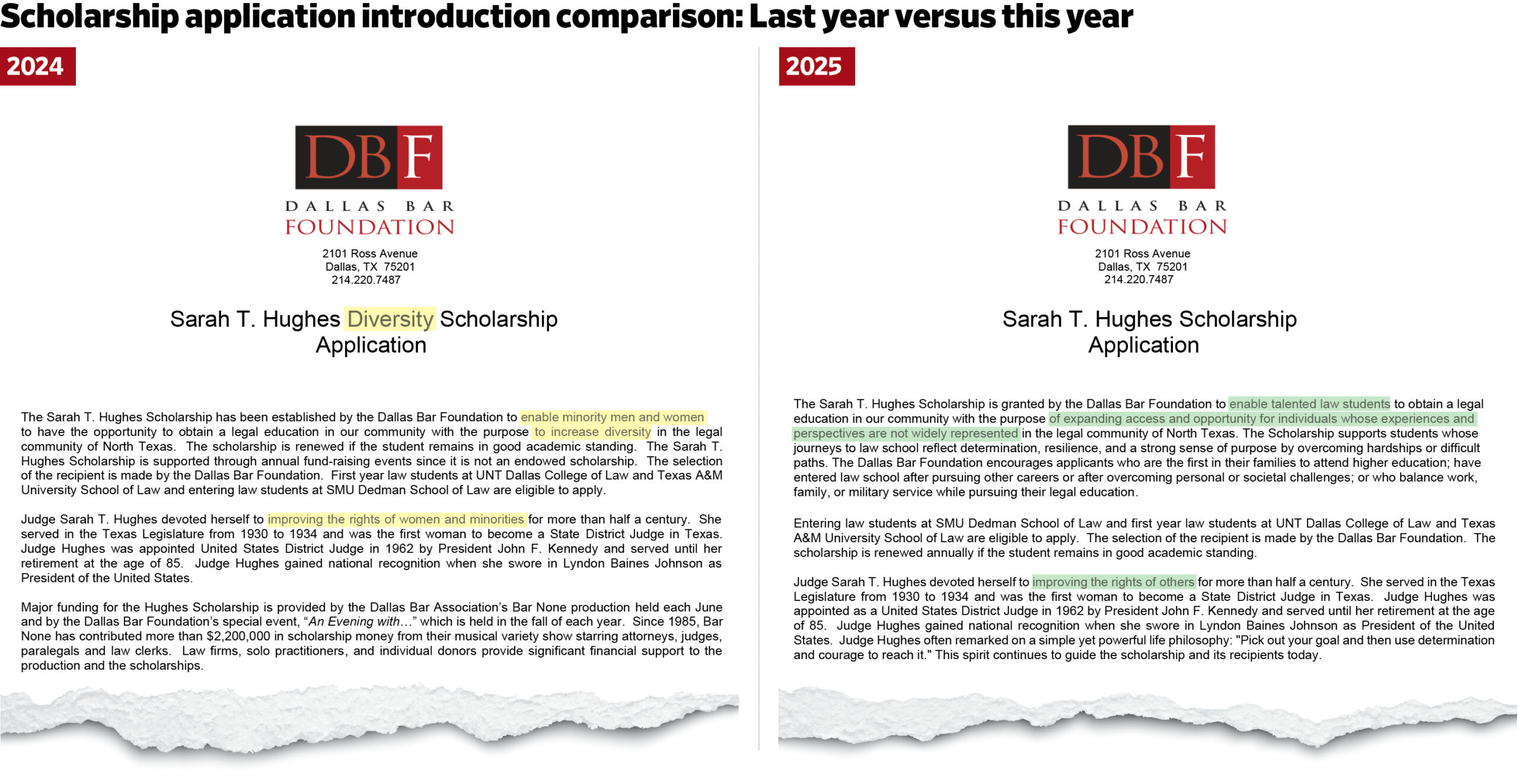The Dallas Bar Foundation has resumed its prestigious scholarship named for former Judge Sarah T. Hughes but has removed “diversity” from the scholarship’s title, references to minority individuals from its description and related elements from the application.
The Foundation resolved to “evolve” the scholarship to “help people overcome hardship and difficult paths,” said Dallas Bar Foundation Chair Gabe Vazquez, a past recipient of the scholarship. The application period closed last month, and recipients will be selected this fall.
Earlier this year, the Foundation paused the Sarah T. Hughes Diversity Scholarship amid uncertainty and potential fundraising challenges at a time when President Donald Trump’s administration is issuing various executive orders regarding diversity initiatives.
When it was called the Sarah T. Hughes Diversity Scholarship, the description said it was established to enable “minority men and women to have the opportunity to obtain a legal education in our community with the purpose to increase diversity in the legal community of North Texas.” It went on to say Judge Hughes “devoted herself to improving the rights of women and minorities for more than half a century.”
The application requested the applicant’s sex and race/ethnicity. It required a 500-word essay detailing what impact the scholarship would have on the applicant’s educational and career goals.
Now called the Sarah T. Hughes Scholarship, its stated purpose is to enable “talented law students to obtain a legal education in our community with the purpose of expanding access and opportunity for individuals whose experiences and perspectives are not widely represented in the legal community of North Texas.”
The following was also added to the description: “The Scholarship supports students whose journeys to law school reflect determination, resilience, and a strong sense of purpose by overcoming hardships or difficult paths. The Dallas Bar Foundation encourages applicants who are the first in their families to attend higher education; have entered law school after pursuing other careers or after overcoming personal or societal challenges; or who balance work, family, or military service while pursuing their legal education.”
The description of Hughes’ advocacy was also amended to say she “devoted herself to improving the rights of others for more than half a century,” as opposed to specifying her advocacy for “women and minorities,” as it previously did.
The Foundation also added, “Judge Hughes often remarked on a simple yet powerful life philosophy: ‘Pick out your goal and then use determination and courage to reach it.’ This spirit continues to guide the scholarship and its recipients today.”

The application still requests the applicant’s sex but does not ask for race/ethnicity. It now requires a 500-word essay about the applicant’s journey to law school and overcoming challenges or hardships. The previously required essay about what impact the scholarship would have on the applicant’s educational and career goals is now optional addition to the hardships essay.
The changes reflect what the scholarship “always really was at the end of the day,” Vazquez said. “It’s really about resiliency and determination and overcoming hardship, which has always been the case.”
The scholarship is available to entering law students at SMU Dedman School of law and first-year law students at UNT Dallas College of Law and Texas A&M University School of Law.
Since 1981, the scholarship has funded the legal education of 78 scholars, including Fifth Circuit Appeals Court Judge Irma Carrillo Ramirez.
Kandace Walter, president of the J.L. Turner Legal Association, Dallas’ African American bar association, said the updated wording seems intended to continue drawing diverse applicants without using the now-controversial term.
Walter, who previously warned that the loss of the scholarship would have a devastating domino effect on the community, said that while she is “thrilled that law students from nontraditional backgrounds will have an opportunity to win the Hughes scholarship, it is disheartening to learn that the scholarship is no longer specifically for minority law students, who remain woefully underrepresented.”
According to the State Bar of Texas, 25 percent of lawyers in 2024 came from minority groups, while 2023 state data shows minorities represent more than 60 percent of the population.
The variety show Bar None has raised about $2.6 million for the scholarship since 1986. Show organizers canceled this year’s fundraiser in light of the pause. Show director Martha Hofmeister told The Texas Lawbook this week that Bar None organizers have been in “rather constant dialogue with one another, with leaders of the Dallas Bar Foundation and with other organizations which have presented such scholarships in the past,” and that they have not yet reached a decision about the future of Bar None.
An article in the Dallas Bar Association’s September issue of its Headnotes publication stated its annual fundraiser, An Evening With Peter Baker and Susan Glasser on Oct. 22, will provide an opportunity for sponsors to specifically elect to support the Hughes Scholarship. The article made no mention of Bar None.
